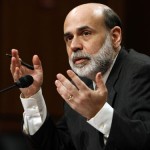Why is the Fed Public Enemy #1?
 A new poll shows that most Americans want the Fed abolished or subject to greater oversight. But how well does the public understand the its role?
A new poll shows that most Americans want the Fed abolished or subject to greater oversight. But how well does the public understand the its role?
Alexander Hamilton wouldn’t have approved of Sarah Palin or the Tea Party’s distrust of the establishment. A new Bloomberg poll on the Federal Reserve would trouble him: according to the survey more Americans want greater oversight of the central bank or hope to see it abolished.
When asked if the central bank should be more accountable to Congress, left independent or abolished, 39 percent said the Federal Reserve should be held more accountable to Congress. Another 16 percent said that it should be abolished. Only 37 percent favor allowing the Fed to do its job undisturbed.
But before both parties use those numbers to attack the Fed and score easy political points, it’s important to ask how well-informed the public is about the Fed’s mission. Polls show that the public holds some serious misconceptions about the economy.
Only 77% know that the budget deficit is larger than it was in the 1990s. 64% know that in recent years the United States has bought more foreign goods than it has sold overseas. A little over half (53%) could properly peg the current unemployment rate in the ballpark of 10%.
And on the bank bailouts (carried out by the Fed)? Only16% said, correctly, that more than half of the loans made to banks under TARP have been paid back. The same percentage of respondents said that none of the loans have been paid back. In Pew Research's July survey, only 34% knew that TARP was even enacted under the Bush administration.
Making matters worse, Sarah Palin recently wrote to the Wall Street Journal to criticize the Fed’s new stimulus proposal. Palin wrote: “it’s time for us to ‘refudiate’ the notion that this dangerous experiment in printing $600 billion out of thin air, with nothing to back it up, will magically fix economic problems.” But why is Palin’s opinion gracing the opinion pages of our nation’s finest financial newspaper in the first place? Has Palin established an understanding of our global economic system?
In an interview with 60 Minutes, Fed Chairman Ben Bernanke was forced to rebut Palin’s mistake: “One myth that’s out there is that what we’re doing is printing money…The money supply is not changing in any significant way.”
The American “can do” attitude is lovely, and its suspicion of authority healthy. But members of Congress should resist the temptation to vilify the Federal Reserve to score political points and the press can do a better job informing the public of the Fed’s role.